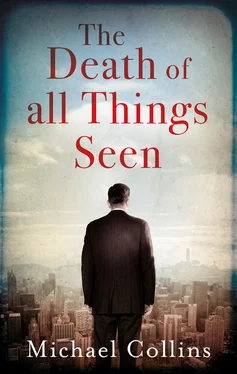There was a story to the story in most everything Joanne said. So it was the case with Schindler’s List . It turned out that back in high school she had dated a junior of Armenian heritage, a wrestler. It accounted for her nascent anti-Semitism. She asked Norman if he knew about ‘The Forgotten Holocaust’, because, apparently, the Jewish holocaust sat as a great and particular national grievance to the Armenian people that their holocaust had been one-upped by the Jews.
Norman knew about the Armenian genocide. He pretended he didn’t, leaving Joanne to communicate the scant details of what she knew. This was how history was best come upon, or so Norman believed, Joanne processing the travails of a high school boyfriend’s parents that in all likelihood had allowed this boyfriend to get into Joanne’s pants in the fumbling reach of new boundaries, in the way life and history were more fully revealed in the act of lived experience than in any history book.
Norman was confident Joanne couldn’t pick out Armenia on a map, but he felt a deep authenticity in the run of her words, in how she couldn’t shut up. He was more interested not in what she said, but how she said it, how the profane, blasphemous and plain hurtful could be so wrapped up in such a good-natured heart, because Joanne was all that, kind-hearted and strong, and nobody could deny it.
She was, he understood, the sort of ingénue, one of those daughters, who, under more pressing and simpler times, could be coaxed into believing almost anything about anybody and counted on to bear from her hips a race of madmen.
He might have said so and ruined what they had between them, so he kept his mouth shut. Minutes then passed in silence.
*
Along the dappled light on Sheridan Road, Joanne pointed to the palatial homes of those who had made it in Investments, Securities and the Law. She slowed down, shielding her eyes against the mid-afternoon glare.
‘You see all this, Grace? In America you can be anything you want to be.’
Norman said, without turning around, ‘Joanne and I, we just didn’t want to be.’
Joanne fake-punched his shoulder. ‘Don’t tell a child that.’
‘Okay, let me clarify. We wanted it, but we couldn’t get it.’
Joanne shook her head and looked into the rear-view mirror. ‘Don’t listen to him, sweetie. You think positive and anything is possible.’
Joanne eased back into her seat. She shook her head in mild admonishment and bit the underside of her lip. A half-minute passed. She seemed deep in thought, her lips moving silently. ‘Why do you have to go tell her something like that? Her success is not predicated on whether we fail or succeed. That’s a legitimate fact.’
Her face was suddenly serious. She looked at Norman as she finished, so he was struck by the inclusive we , but he said nothing.
‘I think being a realist is not the same as being a pessimist. Look at Obama. Son of an immigrant Kenyan, raised by his mother and grandmother.’ She shrugged her shoulders. ‘I think that speaks volumes for who we are as a people.’
Norman added compliantly, ‘ The Audacity of Hope . I read it, and the companion volume by Clinton, The Audacity to Grope .’
Joanne’s eyes narrowed. ‘And you want to be taken seriously as an artist?’
The word artist got to Norman in a way few other compliments could. He felt a sense of her view of him. He was an artist.
He conceded, ‘Maybe you’re right about Obama. It’s a significant step toward equality, or the perception of equality.’
Joanne looked at him, trying to determine whether he was serious or not, and deciding he was, she said, ‘And that’s the first step, the ability to dream.’
Norman nodded. ‘Right.’ He let it play out in a way that gratified Joanne’s view on life and politics. So much of life was compromise and biting your tongue. He said, by way of further advancing her optimism, ‘I think you can divide the political parties along a diverging line of ascendancy. Either you come from somewhere or nowhere. Republicans don’t come with a history or backstory in the way Democrats do.’
Joanne turned. She was the typical community college student, willing to sit through night class, having come from not one, but two, jobs. No doubt Peter Coffey had taken his chances with a series of self-improvers like her.
Norman prattled on. ‘Think about it, FDR and his fight with polio, or Carter, a peanut farmer from the Deep South. What was it Carter said in that Playboy interview? “I’ve committed adultery in my heart many times.” He’s probably the only man who ever had to pretend to have had impure thoughts. And Clinton, brought up by his grandmother. Everybody knew what the White House meant to him. It was part of his humanity. There are stories of him campaigning, shaking a thousand hands, and afterward eating a bucket of Kentucky Fried Chicken with those unwashed hands. That’s democracy.’
Joanne added, ‘Peter says Clinton passed more laws against the poor than Republicans.’
Norman marveled at the sense of how a mind could be so formed by the guiding opinion of another, by even someone as unfaithful as Peter Coffey. Peter, the phantom limb felt long after its amputation. It was something worth understanding, how someone’s influence could outlast their departure.
Norman added, ‘Peter’s right. Politics is all about perception. Clinton’s infidelity made him vulnerable in a Faustian way. All through the impeachment hearings, he cut legislative deals to survive. The great problem for Obama, there’s no dirt on him. You need an essential flaw. It constitutes how compromise and change happens.’
Joanne looked off toward the lake. Peter Coffey jumped in her heart. Norman was aware he had been too cavalier in referencing Peter. He had crossed an invisible border, exposing the tolerable life they were sharing in the shadow of lost loves, so it was suddenly obvious they were doing their very best to be civil and cordial, and it wasn’t quite enough.
Joanne recovered a bit. ‘You forgot Kennedy in your grand theory.’
Norman rallied, anything to get them through the day.
‘Yes, Kennedy had money, but, with him, idealism trumped money. You throw Jackie and Marilyn into the mix and you get the sort of president most any man would want to be. Money is the preoccupation of the Republicans. You have to grow up with money to respect it, to invest it, to make it work in a way that those who don’t grow up with it will never fully comprehend.’
Joanne conceded, ‘I think you’re right.’ She said it on an up note, like the awkwardness had passed. She looked in the rear-view mirror at Grace. ‘Your father, he knows a lot about politics. He’s very, very smart. You should listen to him.’
As she spoke, she put her hand on Norman’s thigh and said quietly, ‘I’m planning on paying you back every red cent you put on my card. I don’t welch on my debts.’
*
They were all suddenly tired. It had been an eventful day, and yet they had survived, or negotiated the day as best they could. They were out here at last.
Norman mentally ran through a list of positives. He was trying very hard to be optimistic.
In the ensuing quiet, Norman’s phone buzzed. The realtor had postponed their meeting until 4 p.m.
Norman stared at the text. His inclination was to turn back. There was little point in seeing the house. He might have suggested it, but he knew Joanne had other ideas about the house. He said nothing. Instead, he checked his email in the quiet stalemate.
Amidst the spam, he came upon an email with a.ca suffix. The name Feldman caught his eye. He read the email quietly.
He looked up. Joanne was preoccupied with the radio and searching for a station.
Читать дальше












